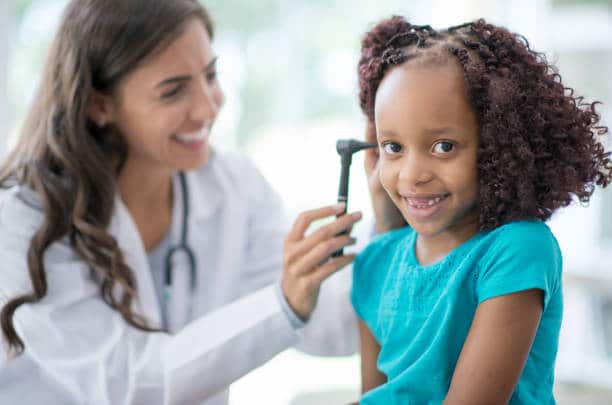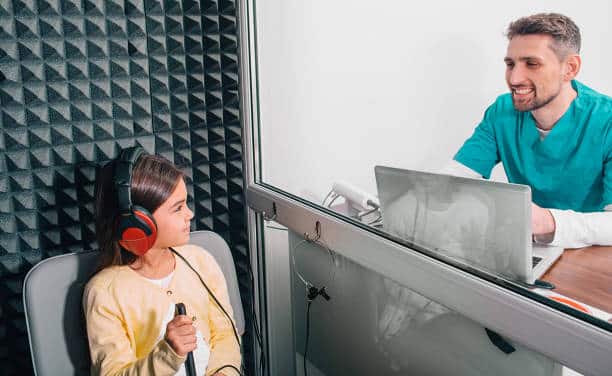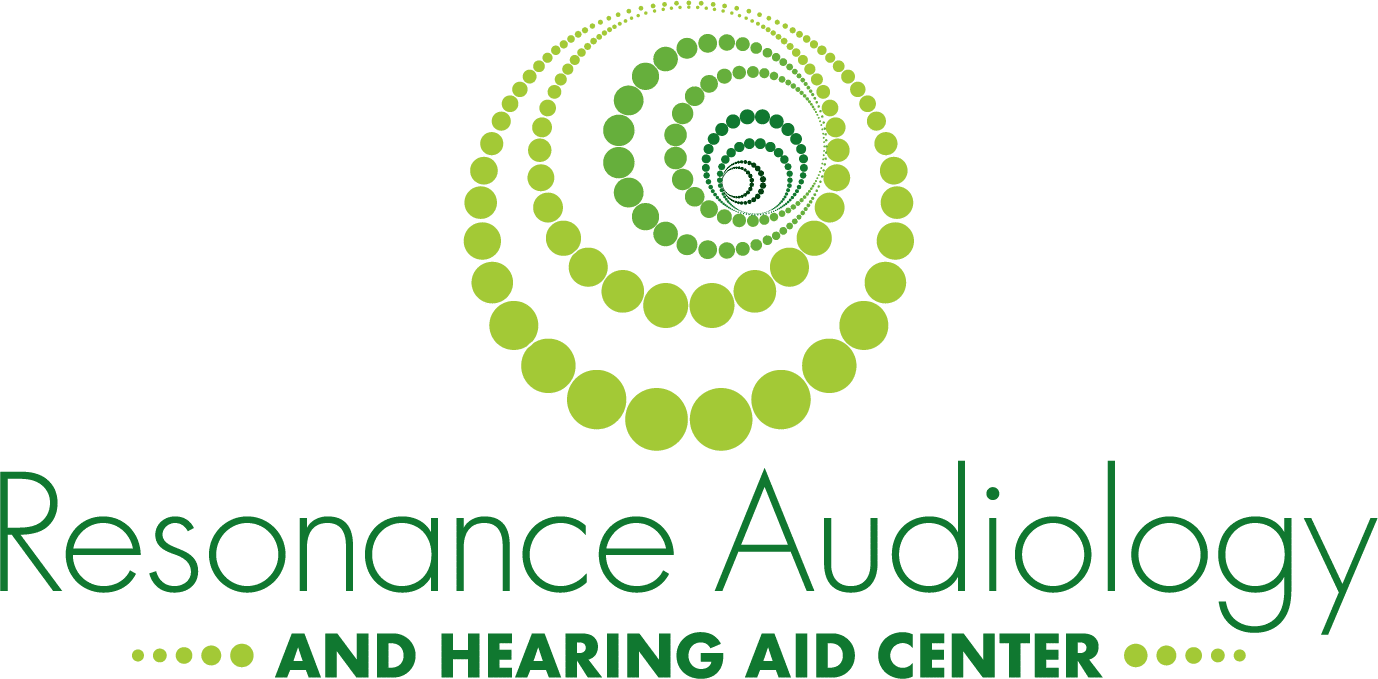The Importance of Early Detection in Ensuring Children’s Hearing Health
In a world full of constant noise, it’s easy to take our hearing for granted. For children, however, hearing is not just a basic sense– it’s an essential tool for learning, socializing, and developing language skills. By identifying hearing issues at an early stage, parents and healthcare professionals can take proactive measures to address them, preventing potential long-term consequences. Whether it’s a genetic condition, exposure to loud noises, or an ear infection, the earlier these issues are detected, the better equipped we are to provide the necessary support and interventions.

From regular screenings to awareness campaigns, there are numerous initiatives aimed at promoting early detection and intervention for children’s hearing health. Let’s join hands and raise awareness about the importance of early detection – because every child deserves the chance to hear the world around them and reach their full potential!
Understanding the importance of early detection
Early detection of hearing loss in children is crucial for several reasons. Firstly, the sooner a hearing issue is identified, the sooner interventions can be put in place to support the child’s development. Hearing loss can have a significant impact on a child’s ability to learn and communicate effectively, which can affect their academic performance and social interactions. By detecting hearing loss early on, parents and healthcare professionals can work together to provide the necessary accommodations and therapies necessary for the child.
Secondly, early detection can help identify the underlying cause (or causes) of hearing loss. While some cases may be due to genetics, others may be the result of exposure to loud noises or ear infections. By pinpointing the cause, further steps can then be taken to address the issues and prevent further damage. For example, if a child has experienced repeated ear infections leading to hearing loss, prompt medical intervention and early detection can both help resolve the infection and prevent any long-term consequences.
Lastly, early detection can also help prevent additional complications that may arise from untreated hearing loss. Children with untreated hearing loss may experience delays in speech and language development, as well as difficulties with social interactions and academic performance. By detecting and addressing the situation early, these potential challenges can be minimized, allowing the child to thrive in all aspects of their life.
Common signs and symptoms of hearing loss in children
Identifying hearing loss in children can be challenging, as they may not yet have the language skills to communicate their difficulties effectively.
However, there are several signs and symptoms that parents and caregivers can look out for. These include:
- Delayed speech and language development: Children may have difficulty acquiring language skills at the same pace as their peers. That being said, they might have trouble pronouncing words correctly, understanding instructions, or experiencing a limited vocabulary.
- Frequent ear infections: Can lead to temporary or permanent hearing loss. If a child experiences frequent ear infections, it is essential to monitor their hearing abilities closely.
- Inattentiveness or lack of response to sounds: Children may seem inattentive or unresponsive to sounds in their environment, i.e. not turning their head toward a sound source or react to their name being called.
- Speaking loudly or unclearly: If a child consistently speaks loudly or unclearly, it may be an indication of hearing loss. They may have difficulty modulating their voice volume or imitating sounds accurately.
- Difficulties in school: Children may struggle to follow instructions, have difficulty concentrating in noisy environments, or show a decline in their grades.
It’s important to note that these signs and symptoms may vary depending on the age of the child and the severity of the hearing loss. If parents or caregivers suspect that a child may have hearing loss, it is crucial to seek an ear doctor for kids for an evaluation and diagnostic testing.
The impact of untreated hearing loss on a child’s development
Untreated hearing loss can have a significant impact on a child’s overall development. As hearing plays a critical role in speech and language acquisition, a child losing their hearing can greatly impede their ability to communicate effectively. In turn, this can affect their social interactions, academic performance, and emotional well-being.
One of the most significant consequences of untreated hearing loss is delayed speech and language development. Children with hearing loss may struggle to develop vocabulary and grammar skills, leading to difficulties in accurately expressing themselves and understanding others. This delay can have a ripple effect on their overall cognitive development, as language skills are closely tied to learning and comprehension.
In addition to language delays, untreated hearing loss can also negatively impact a child’s social interactions. As we mentioned earlier, hearing loss can make it challenging to follow conversations with others, which can lead to feelings of isolation and frustration. These circumstances can affect their self-esteem and confidence, as they may struggle to connect with their peers and participate fully in social activities.
Untreated hearing loss can hinder a child’s progress academically as well. Some might experience issues with following instructions in the classroom, which ultimately can lead to missed assignments and learning gaps. The inability to hear clearly in noisy environments, such as a classroom or playground, can also deter them from being able to engage in group activities and fully participate in classroom discussions.
With all of this to consider, it’s important to note that untreated hearing loss can have long-term consequences for a child’s future as well. It can limit their career options and opportunities, as certain professions may require excellent hearing abilities. By addressing hearing loss early on, parents and healthcare professionals can help mitigate these potential challenges and provide the necessary support for the child to succeed.
Diagnostic tests for early detection of hearing loss in children
To detect hearing loss in children, various diagnostic tests are available. These tests help determine both the type and severity of hearing loss, as well as the underlying cause.
Some common tests include:
- Otoacoustic Emissions (OAE) Test: Measures the sounds that are generated by the inner ear in response to a sound stimulus. It can help determine if the child’s inner ear is functioning properly.
- Auditory Brainstem Response (ABR) Test: Measures the electrical activity of the auditory nerve and brainstem in response to sound. It can provide information about the child’s hearing thresholds and the integrity of the auditory pathways.
- Pure Tone Audiometry: Involves the child wearing headphones and listening to tones at different frequencies and volumes. The child indicates when they hear the sound, allowing the audiologist to determine their hearing thresholds.
These tests, along with a comprehensive medical history and physical examination, can help healthcare professionals diagnose hearing loss and develop an appropriate treatment plan.
The role of parents and caregivers in early detection
Parents and caregivers play a crucial role in the early detection of hearing loss in children. They are often the first to notice any signs or symptoms and can advocate for their child’s hearing health.
Here are some steps parents can take to ensure early detection:
- Regular screenings: Schedule regular hearing screenings for your child, starting from birth. Many hospitals offer newborn hearing screenings, which can detect hearing loss early on. Make sure to continue regular screenings throughout childhood to monitor any changes in hearing abilities.
- Be observant: Pay attention to your child’s behavior and communication skills. Look out for any signs of delayed speech development or lack of response to sounds. Trust your instincts and seek professional evaluation if you have concerns.
- Educate yourself: Learn about the signs and symptoms of hearing loss in children. The more you know, the better equipped you will be to identify any potential issues and seek appropriate help.
- Consult professionals: If you suspect your child may have hearing loss, consult a healthcare professional experienced in pediatric audiology. A kid’s ear doctor can conduct a thorough evaluation, including diagnostic tests, and provide guidance on next steps.
Remember, early detection can make a significant difference in a child’s overall development. By being proactive and attentive, parents and caregivers can ensure that their child receives the necessary support and interventions in order to succeed in the future.

Promoting awareness and education on children’s hearing health
Raising awareness about the importance of early detection of hearing loss in children is crucial and the first step toward early detection and intervention. By raising awareness, we can empower parents, healthcare professionals, and communities to take action and prioritize children’s hearing health.
Here are some initiatives that can help promote awareness and education:
- Education campaigns: Develop educational campaigns targeted at parents, caregivers, and healthcare professionals to provide information about the signs and symptoms of hearing loss, the importance of early detection, available resources and so on.
- Community outreach: Partner with local schools, healthcare facilities and organizations to put together community events and workshops that educate the public about children’s hearing health.
- Collaboration with schools: Work with schools to implement hearing screenings as part of routine health check-ups while also educating teachers and staff about the signs of hearing loss to help them identify potential issues in the classroom.
- Online resources: Create online resources such as websites, blogs, and social media platforms dedicated to children’s hearing health and provide information, resources, and support for parents and caregivers.
- Partnerships with healthcare professionals: Collaborate with pediatricians, audiologists, and other healthcare professionals to raise awareness about the importance of early detection.
Resources and support for families with children with hearing loss
Families with children who have hearing loss may require additional resources and support to navigate their journey. Fortunately, there are many organizations and programs available to assist families in providing the best possible care for their child.
Here are some resources and support options:
- Early Intervention Programs: Provide support and therapies for children with developmental delays, including hearing loss. These programs focus on speech and language development, auditory training, and communication skills.
- Support Groups: Provide families with a sense of community and understanding. They offer the opportunity to connect with other parents facing similar challenges and share experiences and advice.
- Financial Assistance Programs: Some organizations provide financial assistance for families with children with hearing loss. These programs can help cover the costs of diagnostic tests, hearing aids, and other necessary interventions.
- Educational Resources: Available to help families navigate the complexities of hearing loss. These resources provide information about communication options, assistive devices, and strategies to support a child’s learning and development.
- Advocacy Organizations: Provide valuable resources and support. They work towards ensuring equal access to education, healthcare, and other services for children with hearing loss.
By reaching out to any of the above support networks, these resources can help families feel empowered and better equipped to support their child’s hearing health.
Early intervention and treatment options for children with hearing loss
The earlier appropriate interventions are put in place, the more effectively a child’s hearing and overall development can be supported.
Here are some early intervention and treatment options for children with hearing loss:
- Hearing Aids: Hearing aids amplify sounds and improve a child’s ability to hear and understand speech. Pediatric audiologists can help determine the most suitable hearing aids for a child based on their specific needs.
- Cochlear Implants: Cochlear implants bypass the damaged parts of the inner ear and directly stimulate the auditory nerve, allowing the child to perceive sound. Candidacy for cochlear implants is determined through a comprehensive evaluation process.
- Speech and Language Therapy: Speech and language therapy focuses on developing communication skills, improving speech clarity, and enhancing language comprehension.
- Auditory Training: Auditory training exercises help improve their ability to process and understand speech sounds. These exercises can be done in collaboration with a speech and language therapist or an audiologist.
- Assistive Listening Devices: Assistive listening devices, such as FM systems or sound amplification systems, can be used to enhance a child’s ability to hear in specific environments, such as classrooms or social settings.
It’s important to note that the treatment plan for a child with hearing loss varies depending on the their specific needs and the severity of their hearing loss. A multidisciplinary approach involving healthcare professionals, educators, and therapists is often necessary to provide the best overall support for the child’s development.
Conclusion: Taking action for children’s hearing health
Early detection of hearing loss is crucial in ensuring children’s overall well-being and success. By identifying hearing issues at an early stage, parents and healthcare professionals can provide the necessary support and interventions to help children reach their full potential.
If you’re in need of an audiologist for kids in Lancaster, PA, come visit Resonance Audiology! We offer the ultimate experience in hearing healthcare services, and we’re ready to help you or your child with all your hearing needs. Contact us today to get started!
